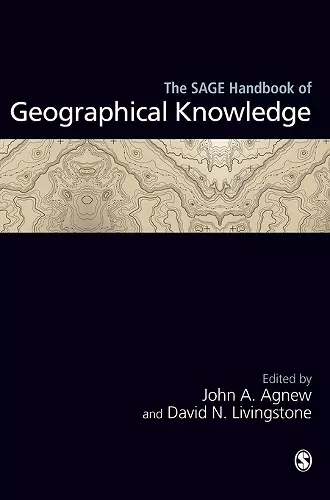The SAGE Handbook of Geographical Knowledge
David N Livingstone editor John Agnew editor
Format:Hardback
Publisher:SAGE Publications Inc
Published:17th Feb '11
Should be back in stock very soon

A refreshingly innovative approach to charting geographical knowledge. A wide range of authors trace the social construction and contestation of geographical ideas through the sites of their production and their relational geographies of engagement. This creative and comprehensive book offers an extremely valuable tool to professionals and students alike.
- Victoria Lawson, University of Washington
"A Handbook that recasts geograph′s history in original, thought-provoking ways. Eschewing the usual chronological march through leading figures and big ideas, it looks at geography against the backdrop of the places and institutional contexts where it has been produced, and the social-cum-intellectual currents underlying some of its most important concepts."
- Alexander B. Murphy, University of Oregon
The SAGE Handbook of Geographical Knowledge is a critical inquiry into how geography as a field of knowledge has been produced, re-produced, and re-imagined.
It comprises three sections on geographical orientations, geography′s venues, and critical geographical concepts and controversies. The first provides an overview of the genealogy of "geography". The second highlights the types of spatial settings and locations in which geographical knowledge has been produced. The third focuses on venues of primary importance in the historical geography of geographical thought.
- Orientations includes chapters on: Geography - the Genealogy of a Term; Geography′s Narratives and Intellectual History
- Geography′s Venues includes chapters on: Field; Laboratory; Observatory; Archive; Centre of Calculation; Mission Station; Battlefield; Museum; Public Sphere; Subaltern Space; Financial Space; Art Studio; Botanical/Zoological Gardens; Learned Societies
- Critical concepts and controversies - includes chapters on: Environmental Determinism; Region; Place; Nature and Culture; Development; Conservation; Geopolitics; Landscape; Time; Cycle of Erosion; Time; Gender; Race/Ethnicity; Social Class; Spatial Analysis; Glaciation; Ice Ages; Map; Climate Change; Urban/Rural.
Comprehensive without claiming to be encyclopedic, textured and nuanced, this Handbook will be a key resource for all researchers with an interest in the pasts, presents and futures of geography.
If we are to take seriously the idea that events, practices, and ideas should not be divorced from their historical and geographical context, then geographical knowledge itself needs to be temporally and spatially situated. Motivated by that proposition, Agnew and Livingston have put together a Handbook that recasts geography’s history in original, thought-provoking ways. Eschewing the usual chronological march through leading figures and big ideas, the Handbook looks at geography against the backdrop of the places and institutional contexts where it has been produced, and the social-cum-intellectual currents underlying some of its most important concepts. The result is a book that fleshes out often-neglected aspects of the discipline’s history, even as it consistently encourages thinking about the relationship between geographical practices and the places, circumstances, and understandings in which those practices are embedded
Alexander B. Murphy
Department of Geography, University of Oregon
The Handbook provides a refreshingly innovative approach to charting geographical knowledge. A wide range of authors trace the social construction and contestation of geographical ideas through the sites of their production and their relational geographies of engagement. This creative and comprehensive book offers an extremely valuable tool to professionals and students alike
Victoria Lawson
University of Washington
ISBN: 9781412910811
Dimensions: unknown
Weight: 1320g
656 pages